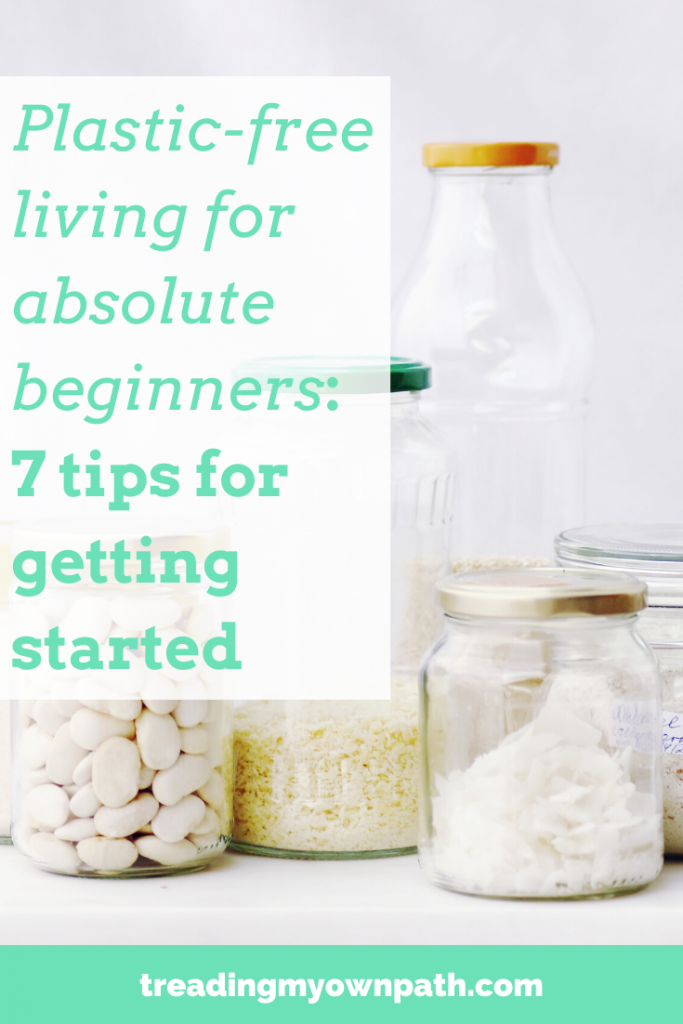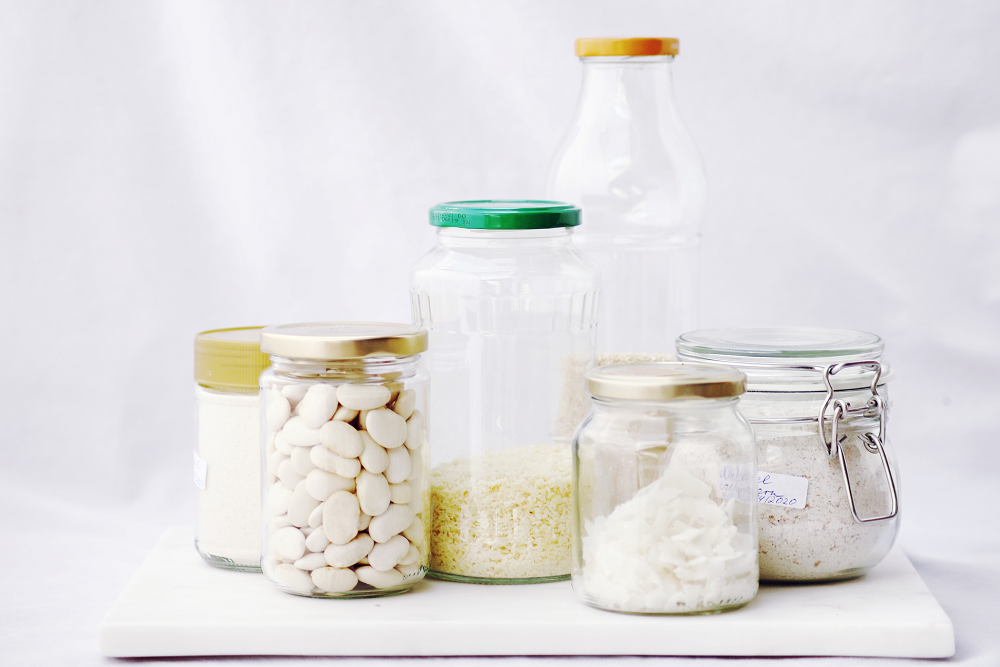Plastic-Free For Absolute Beginners: 7 Tips for Getting Started
When we’re new to living plastic-free or zero waste, just looking at the journey ahead of us can seem a little… daunting. On one hand, we’re eager to make changes, and excited to be making a positive impact on ourselves and the planet. But what first steps to take?
There are so many options it can almost feel overwhelming. If you’re feeling like that, don’t panic! I’m here to help.
If you’re keen to get going with plastic-free or zero waste living but don’t know where to start, here’s a handy guide to help you on your way.

1. Don’t throw anything away!
Before you begin, don’t just throw all your plastic in the bin, or dump it at the charity shop. Whilst it can be tempting to “begin again with a clean slate”, it creates a huge amount of waste. If your main motivation for embracing plastic-free living and zero waste is to reduce waste, this is completely counter-productive.
In time you’ll be able to decide whether you can re-purpose things, pass them on to someone who will use them, or use them up yourself. You’ll learn the best way to dispose of things responsibly. You’ll also know whether you need to replace them.
Plastic-free and zero waste living is a journey, not a race.
2. Remember change takes time, and the more time you spend on it, the faster you’ll see results.
Going plastic-free or zero waste is about changing habits, and change takes time. Like any habit, if you practice every day you’ll get there faster. The more you practice, the easier it will get.
Yes, you can go plastic-free or zero waste and work full time, have children and pursue other hobbies. You will just make slower progress.
Take into account how much time to have to spend learning new habits, and set yourself realistic goals. If your expectations exceed what’s likely or practical for you to achieve, you’ll end up disappointed and disheartened.
3. Go to your regular stores with new eyes.
Bulk stores (especially those that have been established with waste-free and plastic-free living in mind like The Source Bulk Foods) are an ideal place to buy packaging-free groceries, but in the beginning, don’t rule out your regular stores completely.
Instead, take a little extra time, and go to your regular stores and walk up and down every aisle, looking at every single product. Look for products in glass, cardboard, or paper.
When we shop, we often operate on autopilot. We don’t browse the overwhelming choice of products. We tend to buy the one we always buy, or we choose what’s on offer. Now is your chance to look with a different parameter – plastic-free.
You might find there are more alternatives than you realised.
4. Get your reusables ready.
When you first go zero waste or plastic-free grocery shopping, take more reusables than you think you’ll need. As well as reusable shopping bags, take reusable produce bags, glass jars, and glass or plastic containers with lids of various sizes.
Almost everyone has reusable shopping bags; if you don’t, I recommend looking for natural fibres rather than plastic ones that will eventually end up in landfill.
There are many options for reusable bags, and if you sew you can make your own out of old net curtains or bed sheets. If you can’t sew, handmade reusable produce bags can be found via Etsy, an online marketplace for people who do know how to sew.
If you don’t have glass Pyrex or stainless steel food containers, consider using plastic in the short term until you know which sizes work best for you. Glass and stainless steel is an investment, so knowing what you need is helpful before you splash out. If you’re ready to invest, this directory of online zero waste and plastic-free stores might be helpful.
(There are other bits and pieces you might find you need, like cutlery, a water bottle and a coffee cup. You can find the day-to-day reusables I carry in my handbag here.)
5. Look for bulk stores, Farmers Markets and health stores in your local area.
Before you step out the door, it makes sense to look on the internet. Are there any bulk stores close by? Are there any cooperatives that might have food in bulk? What about bakeries or farm shops? Italian grocery stores often have dry goods in bulk, and well-stocked deli counters. Check when local Farmers Markets run, and where.
You can call places to find out if they have a bulk section, but nothing beats going to have a look. Even if bulk isn’t an option, there might be plastic-free and lower waste solutions. Just having a browse can open your mind to some of the potential.
6. One change at a time.
Rather than change everything at once, focus on one thing at a time. It makes sense to tackle things in the order they need replacing. With food, fresh produce comes first, like fruit and vegetables, milk, and bread. Then there’s longer life fresh stuff like yoghurt and cheese. Then there’s dry goods, and it might be a few months before you need alternatives for some of these.
The same will apply in the bathroom, the cleaning cupboard, the wardrobe and the rest of the house.
Work on replacing things as you need to.
7. Join the community!
Zero waste and plastic-free living is a movement, and a movement needs people! You will find it so much easier and far more rewarding if you connect with others on the journey. You’ll be able to share ideas, vent frustrations, ask questions and guide others.
Not everyone has the support of family and friends, at least not at first. Finding a community of like-minded people will give you a strong support network to keep you motivated.
If you can find people locally to connect with, that’s awesome (if you don’t know where to look, the Transition Town movement is a good starting point). If not, there is plenty of opportunity online – and these groups will welcome you with open arms!
Remember, no-one has all the answers on the first day! Plastic-free and zero waste living is a journey. Enjoy the process, have fun, and know that everything you’re doing makes a difference.
Now I’d love to hear from you! If you’re a beginner, is there anywhere in particular that you’re stuck? Anything you’ve been struggling with? If you’re a veteran, are there any other tips you’d like to add? Anything you think I’ve missed out? Any other comments? Please share your thoughts below!
[leadpages_leadbox leadbox_id=1429a0746639c5] [/leadpages_leadbox]



